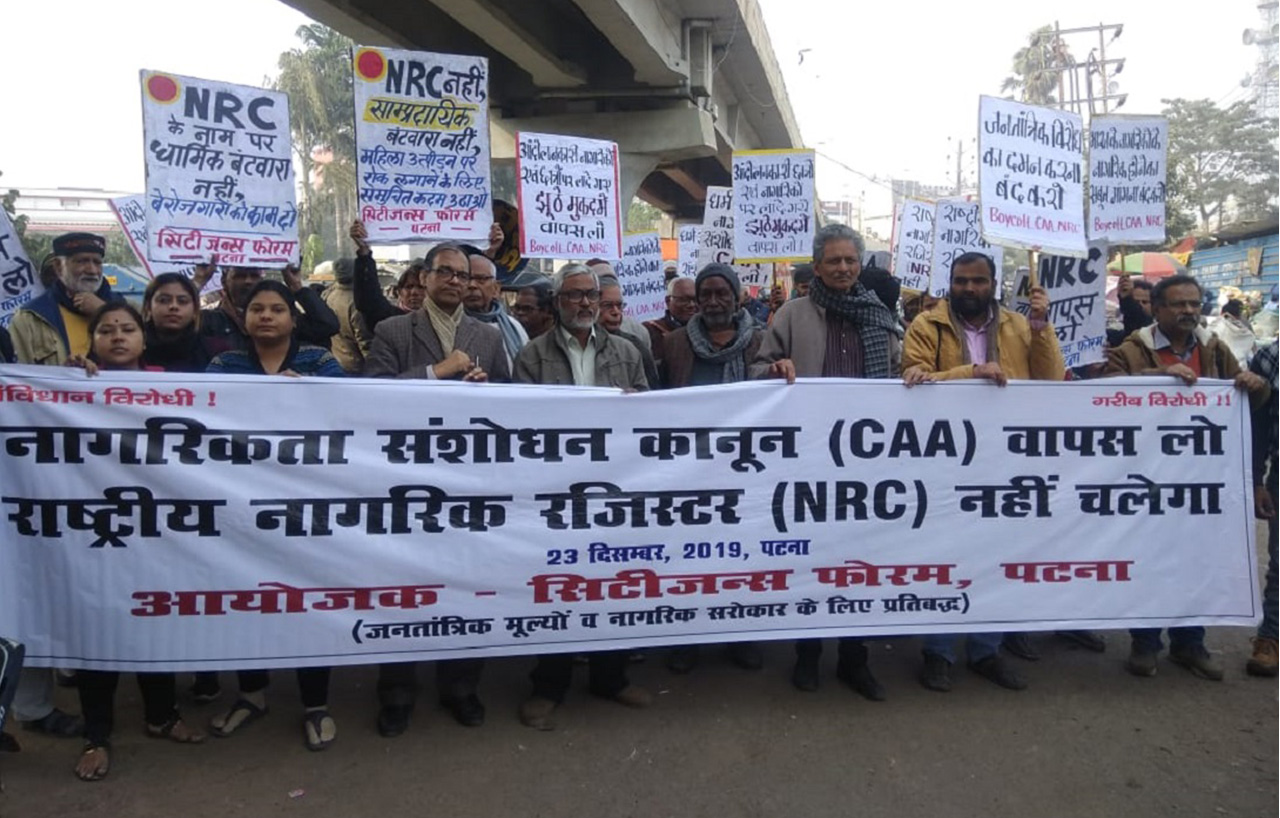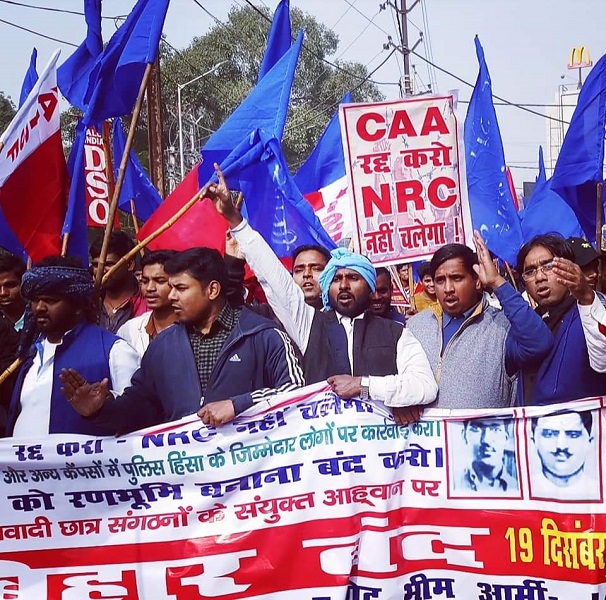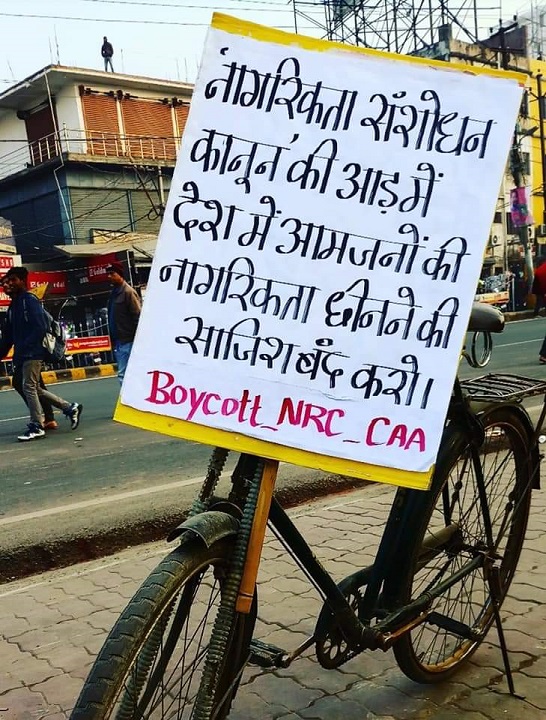The ongoing anti-CAA/NRC protests may pave the way for a new political churning in Bihar. Early signs of this churning have started to manifest, writes Anish Ankur.
Similar to the rest of the country, Bihar too is witnessing a widespread and militant movement against the Citizenship Amendment Act (CAA) and National Register of Citizens (NRC). Anti-CAA/NRC protests have spread to almost every nook and corner of the state. These protests are changing the political dynamics of Bihar, and we are witnessing the signs of formation of new political equations. The ruling JD(U), after initially supporting the CAA in both houses of the parliament, has rapidly launched into damage control mode and has been distancing itself from the BJP by openly declaring that they will not implement the NRC in Bihar.
Protests Against CAA Are Spreading Throughout the Entire State
Almost every day in Patna and other towns and cities of the state, protests are being organized by collective bodies. Such protests are not necessarily organised under the banner of any political party, but have become gatherings where people of different sections and ideologies are joining in. Ten left-democratic student organizations — AISF, AISA, Disha, PDSF, JACP and such — active in Patna University have specifically formed an alliance for this very purpose. Social and cultural activists, theatre artists, writers and forums like ‘Citizens’ Forum’, ‘Loktantrik Jan Pahal’ have come together to mobilize people against the CAA/NRC. A joint forum against CAA/NRC has been formed as well. CPI leader and former JNUSU president Kanhaiya Kumar, has been seen to regularly attend mass meetings against the CAA/NRC. In one such mass meeting held in Purnia, with almost one lakh people in attendance, video clips of Kanhaiya chanting his signature Azadi slogan followed by the agitated masses joining in went viral on social media.
Two Bandh Calls : One Peaceful, Another Violent
Two Bihar bandh have been organised by two different political groups. Left parties – CPI, CPI (M), CPI(ML), RSP, Forward Block and such – issued a call for a bandh on 19 December as part of the nationwide day of protest against the CAA and NRC. A lot of parties, like the Hindustani Awam Morcha (HAM) led by former chief minister Jitan Ram Manjhi, the Rashtriya Lok Samta Party (RLSP) led by Upendra Kushwaha, the Jan Adhikar Party (JAP) led by Pappu Yadav and the Mukesh Sahni-led Vikassheel Insaan Party (VIP) and also the Bhim Army supported the call for the bandh issued by the Left. These political outfits joining cause with the Left parties, given the recent political history of the state, is a new development.
The RJD, currently by led Tejaswi Yadav, independently called for a bandh just two days later. While the bandh called by the Left parties was by and large peaceful, violence erupted during RJD’s bandh call.
In the communally sensitive area of Phulwari Sharif, a neighbourhood of Patna, public property was damaged and a place of worship was vandalized by miscreants, which led to a clash between members of two communities. When supporters of the bandh were taking out a procession in Phulwari Sharif, an area with a significant Muslim presence, an attack on the procession lead to riot and subsequently, arson. Photo journalists like Dinesh Kumar were brutally attacked by an unruly mob, and sustained head injuries. According to eyewitnesses, some RSS/Bajang Dal activists had mingled with the protesters and actively participated in fomenting the violence, while the blame was levelled against the RJD supporters.
The ruling NDA condemned the RJD for its violence. The RJD was on the defensive about the attacks on journalists by its supporters. Wherever RJD supporters were found guilty, the new RJD president and senior leader Jagdanand Singh acted swiftly by removing them. Jagdanand Singh summarily expelled RJD’s Bhagalpur district party president Tirupati Nath Yadav and district youth president Meraj Akhtar for engaging in acts of violence.
Disturbance in Phulwari Sharif
However, the situation in Phulwari Sharif, more than a week after the incident, has returned to normal. The police aren’t allowing any protests against the CAA/NRC in this particular area. More than forty persons have been arrested so far. Further, it has been reported that many innocents have been booked. A procession organized under the banner of the INSAF Manch, an outfit of CPI(ML), on 27 December was not allowed to proceed by the administration. CPI(ML) leader Dhirendra Jha condemned the police for its double standards. “On the one hand, BJP/Bajrang Dal activists are taking out procession by openly waving swords in their hands, while on the other hand, permission for our peaceful protest is being denied. Administration have even booked the protesting activists,” Jha said.
Why Bihar Didn’t Go the U.P. Way
Although protesters are being arrested and intimidated by the police like in other places, the Bihar police didn’t act like its counterpart in Uttar Pradesh, where more than twenty people have died in police firing. A noticeable difference between Bihar and other states is that despite significant protest and two statewide bandh calls, there have not been any deaths and suspension of internet services. But why did the situation in Bihar not go the UP way, despite being ruled by BJP? Social activist and educationist Anil Kumar Rai opined, “Nitish Kumar is in dilemma [sic] about how to adjust with [sic] this new political scenario. After watching the all India protests, Nitish Kumar, perhaps is in the defensive, and allowing the protesters a free hand to a certain extent, with the purpose of dousing the anger of the party’s secular constituency. In Bihar police have not resorted to tough measures like U.P. Here, mostly the rightwing forces are disturbing the peaceful protests. Violence only happened when democratic protests have been thwarted.”
Dissent in Nitish Kumar Camp
In Bihar, political analysts were expecting that given the public posturing, Nitish Kumar will not support the Citizenship Amendment Bill (CAB) in Parliament. Nitish Kumar, who on an earlier occasion had expressed his reservations against the CAB, came to the rescue of the BJP government at the very last moment. As senior RJD leader Shivanand Tiwary said “It’s strange how Nitish Kumar has turned around.” Another JD(U) leader Pawan Kumar Verma said, “Nitish gave a lecture for about 45 minutes against CAB in the party meeting. In my view, someone is blackmailing Nitish Kumar“.
Many JD(U) leaders, like national vice president Prashant Kishore and former Rajya Sabha members Pawan Kumar Verma and Ghulam Rasul Baliyawi, along with several leaders and former ministers like Ashok Kumar Chaudhry and Shyam Rajak have expressed displeasure over Nitish Kumar’s support for the Citizenship Amendment Act.
Another NDA partner in Bihar, the Lok Janshakti Party (LJP) led by Ramvilas Paswan, also raised concerns by demanding a meeting with the NDA to resolve this crisis. It seems that both NDA partners have faced political backlash by supporting the CAA, and are now trying to manage the complexities that have emerged in the aftermath of the passage of the bill. Incidentally, both JD(U) and LJP drew blanks in the recently held Jharkhand assembly elections.
It seems, after their support for the CAA , the JD(U)’s position in Seemanchal area is on shaky ground. JD(U) minority cell general secretary, Khawaja Shahid , who hails from Katihar district of Seemanchal area, resigned from his post in response to the party’s decision to back the CAA. In a press statement, he held Nitish Kumar responsible for JD(U)’s stand: “The decision of the chief minister Nitish Kumar was against the party’s constitution which supports secularism. I don’t support his decision to support the act.”
Dalit-Muslim Alliance in Seemanchal Area
The ongoing CAA protests are changing the nature of political alliance in Bihar. Jitan Ram Manjhi, who had been part of a secular alliance led by RJD, is now keen to take independent initiative. On 29 December, a joint rally was organized by the Jitan Ram Manjhi-led Hindustani Awam Morcha (Secular) and the Asaduddin Owaisi-led All India Majlis-e-Ittehadul Muslimeen (AIMIM) against the CAA/NRC in Kishanganj. Such a rally marks the beginning of new political developments.
Asaduddin Owaisi, for instance, has regularly visited the Seemanchal area after 2014. And it paid political dividends to his party. In the recently held by-election for the Kishanganj assembly seat, AIMIM snatched this seat from the Congress and managed to get a foothold in Bihar’s politics. AIMIM’s victory has sent alarms to the secular parties of the state.
Political analysts are interpreting this rally to be the first step in the formation of a Dalit-Muslim (DM) alliance in Bihar. After Kishanganj, it might be extended to the entire state. After Ramvilas Paswan (former CM), Jitan Ram Manjhi is the prominent Dalit face in Bihar’s political landscape. Kishanganj is a part of the Seemanchal region, which also comprises the districts of Purnia, Araria, and Katihar, and has a significant Muslim population. The region has four seats in the parliament and twenty-three in the state assembly. In 2015, 10 assembly seats elected Muslims as MLAs. It is certain that Seemanchal will be the new centre of a political recombination in the post-CAA era.
Jitan Ram Manjhi’s move has raised eyebrows within the grand alliance. However, Jitan Ram Manjhi, in the last moment, skipped the rally on 29 December and instead chose to attend the swearing-in ceremony of Hemant Soren as the chief minister of Jharkhand. Sources said that Manjhi’s decision to skip the Kishanganj rally came after its leaders expressed their strong resentment over his decision.
What the future holds for the state is yet unclear. However, the anti-CAA protests may pave the way for a new political churning in Bihar. Early signs of this churning have started to manifest. But how will this shape the political landscape of state? Only time will tell.
Anish Ankur is a social and cultural activist from Bihar.





Very good anylising report